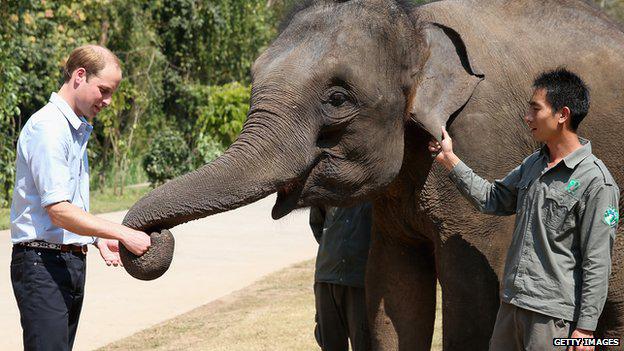英国威廉王子亲切抚摸中国野生大象

Prince William kept the best for last. After two days of travelling in China, his third and final day of engagements in China included delivering a basket of carrots to a 13-year-old Asian elephant called Ran Ran.
The prince does a lot of charity work to highlight elephant killing and the trade in ivory. In southwest Yunnan province, he heard about the dangers to China's remaining 250 wild elephants.
Ran Ran herself was found in 2005 with her leg hurt. But as Prince William heard from local conservationists and forestry police, the greatest threat to China's wild elephants is no longer poaching but habitat destruction.
It's the same story I heard when I spent three days with Chang Zongbo of the forestry police, a man who has spent his life trying to protect what remains of Yunnan's rainforest and its wildlife.
"It's war." Chang Zongbo turns round in the driver's seat to make his point. He does that a lot. And when he does, he's not looking at the road ahead. Our police jeep slows to elephant walking pace.
In all his 27 years with China's forestry police, Chang Zongbo has climbed every one of these mountains, tracking poachers and loggers.
"A bag of rice, a lighter, salt and a knife. That's all I need to set off with," he says. "We eat fruit and berries. Or we catch fish. We go for days, following the poachers and then waiting till they're asleep at night. That's the safest time to arrest them."
Ironically, China is probably one of the safest place to be for an elephant these days.
本时文内容由奇速英语国际教育研究院原创编写,禁止复制和任何商业用途,版权所有,侵权必究!